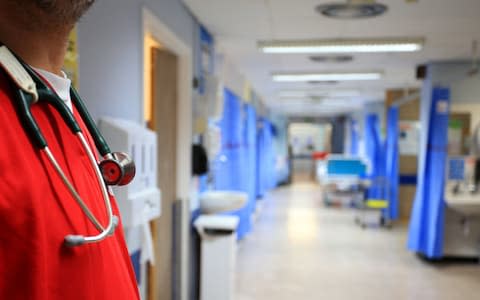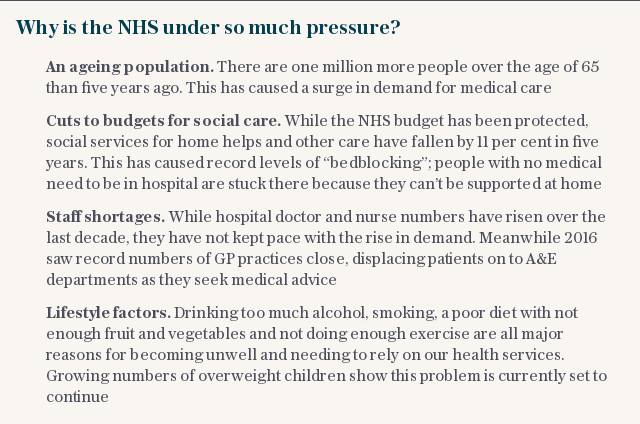Brexit NHS pledge could still be met claims Hammond aide - as experts warn winter boost will be spent in a day

The NHS could still get the £350m a week funding boost promised on the Brexit bus, the Chancellor’s aide has claimed - amid warnings that the latest cash boost will be spent in one day.
Health officials will meet next week to discuss rationing measures, after expressing disappointment at the funds awarded in Wednesday’s budget.
The health service will receive an immediate cash boost of £350m to tide it through the winter, as part of a £2.8bn boost to revenue funding over three years.
NHS chiefs say the funding is not enough, and compares poorly to the pledge of an extra £350m a week made by the Vote Leave campaign.

On Thursday, Kwasi Kwarteng, Philip Hammond’s parliamentary private secretary, insisted that pledge could still be met, after Britain leaves the EU.
The MP said he believed that the promise on the side of the Vote Leave buses, to deliver £350m a week for the NHS, still held good.
“That’s what was said on the side of the bus. And I think actually that we could deliver that. That’s my own view. That’s a personal view,” he said, in a BBC Radio 5 Live interview.
“We spend £350m a week now for our EU contributions. Now when that ends, we will have that money. And it would be possible, if you were a Chancellor or someone leading a government, to use that money on the NHS. All those things are incontestable. That is the truth,” he told Emma Barnett.
Health chiefs will meet next week to discuss the introduction of deeper rationing measures having already warned of an “inevitable” lengthening in waiting lists.
But think tanks suggested the immediate cash injection, aimed at averting an NHS crisis this winter, may do little to help it withstand growing pressures.
Prof John Appleby from the Nuffield Trust told a BMJ debate:”£350 million sounds like a lot, but is a day’s running costs for the NHS.”
And Siva Anandaciva, chief analyst for the King’s Fund, suggested the funding had come so late that the NHS would be forced to pay bumper rates for extra help.
“It’s already November; it’s hard to see how you are going spend that money in a value for money way.” he said.
“You can buy extra capacity for operations from the independent sector, you can get more staff on temporary contracts at premium payment; but all of this would have been more effective if the money had been given the earlier in the financial year,” he said.
On Thursday a report by the European Commission said hospitals in the UK are working at “near-full capacity” with the second highest levels of bed occupancy in Europe, with only Ireland having higher levels of crowding. The study also shows Britain has the third lowest number of beds and doctors in the EU, compared with its population. The analysis of Organisation for Economic Co-operation and Development data also warned of a sharp drop in nursing levels, and said average length of stay is now a full day shorter than the EU average.
Earlier in the day Mr Hammond suggested NHS leaders complaining about the funding should focus on cutting waste in the NHS.
The Chancellor said the Treasury would work closely with Simon Stevens, head of the NHS, to improve health service productivity.
"Simon Stevens set out a five-year plan for the NHS in 2014 which we funded in full and that five-year plan has not yet been delivered," he told ITV's Good Morning Britain.
"The NHS have come back and said, 'look, demand has been higher than we expected, we need some more money', and we have put some more money in.
"We will continue to work closely with the NHS management and the Department for Health to make sure that we cut out waste in the service, that we focus the money that is available on the frontline on delivering for patients and we get the outcomes that the NHS five-year plan said it could deliver over that period of time,” he said.


 Yahoo News
Yahoo News 
